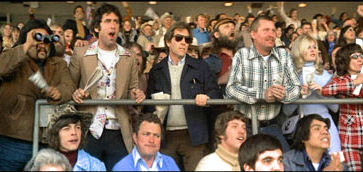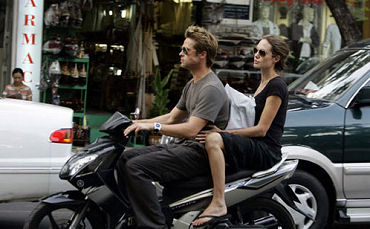One of the best-written appreciations of Robert Altman‘s California Split I’ve read anywhere. The author is Tom Block; the site is called The High Hat.

One of the best-written appreciations of Robert Altman‘s California Split I’ve read anywhere. The author is Tom Block; the site is called The High Hat.

‘You know, we don’t do things like you do in Hollywood, bling bling. Here, it’s bling pow.'” — pissed-off South African guy with a gun talking tough to Leonardo DiCaprio while conveying a reported threat to Djimon Honsou during filming of Blood Diamond, according to a story told by Honsou at a recent press conference and written up by L.A. Daily News critic and “Reel Deal” blogger Bob Strauss.

In an 11.23 L.A. Times piece about Robert Altman, Prairie Home Companion creator Garrison Keillor says when they first met he “tried to interest him in making a movie about a man coming back to Minnesota to bury his father, a winter movie. ‘There haven’t been many movies made in winter,’ I said. And Altman replied, “You would quickly find out why.’ He declined. ‘In the end,’ he said, ‘the death of an old man is not a tragedy.'” (Joe Leydon sent me the call-out.)
Watched the trailer again for Harry Potter and the Order of the Phoenix (Warner Bros., 7.13), and you’re left with one main impression, which is that it’s a hormonal coming-out party. Daniel Radcliffe has developed a weight-lifter’s bull neck and has basically turned into Sammy Stud (the Katie Leung kissing scene, his plans to do Equus in the spring) along with a fiercer, angrier look in his face when asked to register deep emotion. Boys of 11 and 12 are into imaginary realms and barely notice the scent of girls — not so when they reach 16 and 17, and no amount of formulaic CG diversion can hide this simple fact.
Darren Aronofsky‘s The Fountain “is visually intoxicating — the images have a luminous psychedelic beauty — and the film’s themes emerge elegantly out of the story’s intricately-looped tri-level structure. It’s a new kind of science-fiction movie, and, unusually for that boys’ club genre, probably a great date movie too. Mainly, though, as they used to say back in the Roger Corman days, it’s a trip.” — MTV.com’s Kurt Loder refraining the stoner mantra.
In her 11.25 piece called “No One To Lose To,” N.Y. Times columnist Maureen Dowd quotes former Times reporter Neil Sheehan, author of “A Bright Shining Lie,” to wit:
“In Vietnam, there were just two sides to the civil war. You had a government in Hanoi with a structure of command and an army and a guerrilla movement that would obey what they were told to do. So you had law and order in Saigon immediately after the war ended. In Iraq, there’s no one like that for us to lose to and then do business with.”
In response to which Dowd writes, “The questions are no longer whether there’s a civil war [in Iraq] or whether we can achieve a military victory. The only question is, who can we turn the country over to? At the moment, that would be no one.”
Happy Feet bounced back yesterday from a very temporary Thanksgiving Day (i.e., Thursday) defeat at the hands of Daniel Craig‘s 007. The Birds tallied $15,692,015 on Friday compared to Casino Royale‘s $12,928,000…families out in force. Deck the Halls did $4,952,000, Borat $4,351,000, Santa Clause 3 $4,230,000, Stranger Than Fiction $2,461,000, Flushed Away $2,293,000 and Bobby $1750. In limited N.Y. and L.A. runs, The History Boys did about $36,000 in 7 theatres or $5140 a print — okay but not much. (Figure a projected $132,000 for 5 days.) Fiction‘s cume is about $32,008,000 after three weeks. It will do about $8 million for the 5-day Thanksgiving weekend, and next weekend it’ll be down to $3 million — it’ll be a push to $40 million altogether. Not bad for a film that doesn’t work, but in relation to cost (and Will Ferrell‘s fee) it’s probably a short-faller.
One of my all-time favorite improvs in a Robert Altman film — fast, loose, totally spur-of-the-moment — is one spoken by Elliot Gould in The Long Goodbye.

Phillip Marlowe (Gould) is speaking to a couple of local officials in a small Mexican town about the death of old friend Terry Lennox (Jim Bouton ), whom Marlowe has always known deep down to be a frosty taker-user- manipulator. Speaking in typical heavily-accented, south-of-the-border English, one of the officials says, “You were acquainted with the deceased?” And Marlowe/Gould says, “The diseased?…yeah, right.” Deft stuff like this never turned up in any other director’s films.
Nine reasons why Robert Altman mattered, as assembled by Toronto Star critic Geoff Pevere: he was brilliant at ensemble pieces, he was phenomenally “in the zone” from ’70 to ’75, his pioneering use of multi-track, overlapping sound, he always packed lots of visual information into scenes and was sometimes into long takes (like that famous opening shot in The Player), he was a superb genre-deconstuctor, he was great at inspiring and capturing improvisation, he had a running stock company of actors who turned up time and again, he was always pissed off about something and put these beefs into his films, and he never stopped working.
On 10.20, Hollywood Wiretap columnist Pete Hammond ran a piece about how playing real-life figures seems to usher in Oscar contender talk. Three or four days ago a very similar AP story by an anonymous writer was posted on MSNBC — the exact same idea with a few more quotes.
Think of the presumed essence of Joe Queenan — that very funny (often hilarious), always irreverent, smart-assed film/ culture writer — and then imagine some middle-aged cultural regressive…some staunchly rural, long-of-tooth, Kentucky Fried Chicken-subsisting, V.F.W.- supporting yeehaw who watches Fox News. Once you’ve done that, and once you’ve hankie-dabbed the tears streaming down your cheeks following your latest re-reading of Tom Brokaw’s “The Greatest Generation”, tell me who wrote the following:
“When Borat was first released, blue-state sophisticates in New York and Los Angeles were delirious, overjoyed that Sacha Baron Cohen was savaging evangelicals and cowboys and hicks, as if this were either daring or original. Their rationale was that Cohen was merely playing with our heads, forcing us to reassess our convictions. No, he isn’t. Baron Cohen is just another English public school boy who hates Americans.
“It is fine to hate Americans; it is one of Europe’s oldest traditions. But the men who flew the bombing raids over Berlin and the men who died at Omaha Beach and the women who built the Flying Fortresses and Sherman tanks that helped defeat Hitler are the very same people that Baron Cohen pisses all over in Borat. A lot of folks named Cohen would not even be here making anti-American movies if it were not for the hayseeds he despises.
“Personally speaking, it does not bother me that Baron Cohen hates Americans; some of my best friends hate Americans. But it bothers me that my fellow Americans are making yet another odious twit from Cambridge rich. Happily, as Baron Cohen is discovering, if you are going to spit on Americans, you had better be careful which Americans you spit on. As the saying goes in the Bronx: if you mess with us, we’re going to mess with you.”